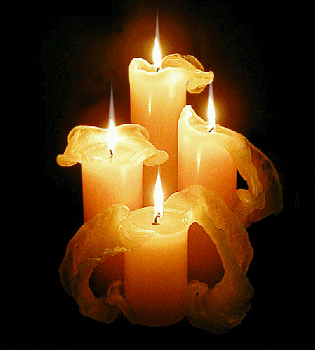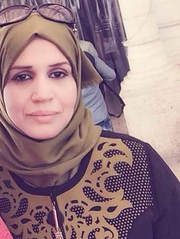14 oct 2018
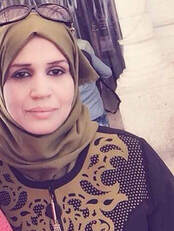
Yacoub al-Rawbi, whose wife was killed in a car accident in the West Bank after her vehicle was allegedly pelted with stones by Jewish settlers, claims the family 'does not seek revenge' only 'punishment for murderers'; Settlers in response: 'Statistics show Arabs are usually the ones throwing stones.'
Yacoub al-Rawbi, the widower of the Palestinian woman killed in a car accident in the West Bank after her vehicle was allegedly pelted with stones by Jewish settlers, insisted Sunday the settlers near the Tapuach Junction are to blame for her death but emphasized that the family “does not seek revenge."
In an interview with Ynet, al-Rawbi recalled the events which led to the tragic incident in which Aisha al-Rawbi was killed.
“One of the stones shattered the windshield, penetrated the car and struck my wife in the head," he stressed.
The investigation is being handled by the Judea and Samaria District Police, in cooperation with the Jewish Division of the Shin Bet, which is responsible for nationalistic crime committed by Jews against Arabs. So far, no evidence linking the settlers to the scene of the incident was found.
On Saturday, the Jerusalem Magistrate's Court issued a gag order on the investigation into the of the death of Rawbi last Friday evening, a Palestinian resident of the northern West Bank village of Biddya. Her husband and nine-year-old daughter were in the car as well.
Rawbi, 47, died after spending two days at her eldest daughter’s house in Hebron, where she had attended a wedding of a relative.
"She was supposed to return home the day before the incident, but she decided to postpone her return because she was afraid of the settlers," the widower said, adding that he eventually drove to Hebron himself on Friday to pick up his wife.
In two weeks, the Rawbi’s third daughter was due to get married.
"I drove to pick up Aisha from Hebron to start preparing for the wedding … when we got close to the Rehelim settlement (near the Tapuach Junction), I heard people shouting in Hebrew and then the stone was thrown.
"I did not realize at first that my wife was hurt because she did not scream or say a single word. Then I looked at her and saw she wasn’t breathing. Her face was full of blood …. The daughter that was in the car started screaming ‘my mother is dead, my mother is dead,’ she was left emotionally scarred by that, she is not letting go of her mother’s phone,” Yacoub described.
According to the widower, the family does “not want revenge, only to catch and punish those who murdered her."
In recent days, following the surge of terror attacks in the West Bank, defense officials have been concerned of a possible increase in Jewish revenge attacks against Palestinians. For the time being, there is no known detainee, nor is it clear whether Jews are indeed responsible for the tragedy.
On Thursday, after the stabbing attack in which an IDF reservist was moderately wounded, a spontaneous demonstration of hilltop youth took place in the area, prompting the Border Police to arrest some of the participants.
Tzvi Sukkot, from the settlement of Yitzhar, told Ynet he is sceptical regarding the possibility that Rawbi was killed by settlers.
"It's impossible to know who did it, but statistics show that Arabs are usually the ones throwing stones," he exclaimed.
Some right wing activists also criticized the Shin Bet’s involvement in the investigation.
“The experience proves that the Jewish Division of the Shin Bet investigates the hilltop youths in an aggressive and problematic manner, which does not lead to the truth, but rather to false confessions,” said Itamar Ben-Gvir from the far-right Otzma Yehudit party.
In addition, UN envoy to the Middle East, Nickolay Mladenov, addressed the incident via his official Twitter account.
"I condemn the attack in which a woman was killed by stones allegedly thrown by Israeli perpetrators. Those responsible should be brought to justice quickly. I call on all sides to stand against violence and terrorism," he wrote on the social network.
Yacoub al-Rawbi, the widower of the Palestinian woman killed in a car accident in the West Bank after her vehicle was allegedly pelted with stones by Jewish settlers, insisted Sunday the settlers near the Tapuach Junction are to blame for her death but emphasized that the family “does not seek revenge."
In an interview with Ynet, al-Rawbi recalled the events which led to the tragic incident in which Aisha al-Rawbi was killed.
“One of the stones shattered the windshield, penetrated the car and struck my wife in the head," he stressed.
The investigation is being handled by the Judea and Samaria District Police, in cooperation with the Jewish Division of the Shin Bet, which is responsible for nationalistic crime committed by Jews against Arabs. So far, no evidence linking the settlers to the scene of the incident was found.
On Saturday, the Jerusalem Magistrate's Court issued a gag order on the investigation into the of the death of Rawbi last Friday evening, a Palestinian resident of the northern West Bank village of Biddya. Her husband and nine-year-old daughter were in the car as well.
Rawbi, 47, died after spending two days at her eldest daughter’s house in Hebron, where she had attended a wedding of a relative.
"She was supposed to return home the day before the incident, but she decided to postpone her return because she was afraid of the settlers," the widower said, adding that he eventually drove to Hebron himself on Friday to pick up his wife.
In two weeks, the Rawbi’s third daughter was due to get married.
"I drove to pick up Aisha from Hebron to start preparing for the wedding … when we got close to the Rehelim settlement (near the Tapuach Junction), I heard people shouting in Hebrew and then the stone was thrown.
"I did not realize at first that my wife was hurt because she did not scream or say a single word. Then I looked at her and saw she wasn’t breathing. Her face was full of blood …. The daughter that was in the car started screaming ‘my mother is dead, my mother is dead,’ she was left emotionally scarred by that, she is not letting go of her mother’s phone,” Yacoub described.
According to the widower, the family does “not want revenge, only to catch and punish those who murdered her."
In recent days, following the surge of terror attacks in the West Bank, defense officials have been concerned of a possible increase in Jewish revenge attacks against Palestinians. For the time being, there is no known detainee, nor is it clear whether Jews are indeed responsible for the tragedy.
On Thursday, after the stabbing attack in which an IDF reservist was moderately wounded, a spontaneous demonstration of hilltop youth took place in the area, prompting the Border Police to arrest some of the participants.
Tzvi Sukkot, from the settlement of Yitzhar, told Ynet he is sceptical regarding the possibility that Rawbi was killed by settlers.
"It's impossible to know who did it, but statistics show that Arabs are usually the ones throwing stones," he exclaimed.
Some right wing activists also criticized the Shin Bet’s involvement in the investigation.
“The experience proves that the Jewish Division of the Shin Bet investigates the hilltop youths in an aggressive and problematic manner, which does not lead to the truth, but rather to false confessions,” said Itamar Ben-Gvir from the far-right Otzma Yehudit party.
In addition, UN envoy to the Middle East, Nickolay Mladenov, addressed the incident via his official Twitter account.
"I condemn the attack in which a woman was killed by stones allegedly thrown by Israeli perpetrators. Those responsible should be brought to justice quickly. I call on all sides to stand against violence and terrorism," he wrote on the social network.
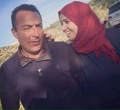
Rama, eight years old, saw her mother’s murder before her eyes at the hands of Israeli settlers, experiencing the detail, horror, and even arrogance and terror of its Israeli perpetrators, those strangers who have been spreading havoc since they sat foot in Palestine 70 years ago.
Rama sat in the back seat of her father’s car as they were returning from a visit to their relatives in Hebron to the south of the West Bank. They passed dozens of Israeli military roadblocks on their way to the north where they live, but a group of Israeli settlers were plotting death for the Palestinian family after one of those barriers.
Death was waiting the Palestinian family near the Za'tara checkpoint, east of Salfit, not far from their town to the west of Salfit. Settlers hurled a large stone at their car, hitting the mother, Aisha al-Rabi.
“I was with my mother and father in the car, and as we reached the Za'tara checkpoint near Salfit, I heard a loud sound of rocks being hurled at the car. It was hurled by settlers. One of them hit my mother’s head who had no chance even to scream,” said Rama.
Rama screamed at the top of her voice, as horror filled the place, shutting down all other sounds except for death, whose smell scattered in the place. Settlers were committing another terrorist crime against Palestinian civilians.
The weeping eyes of relatives and sympathizers were focusing on Rama in the house of martyr Aisha, west of Salfit. She says, “My mother is no more,” making everyone around her cry along with her.
“My mother has gone, I want my mother,” repeated Rama, as a sound in the house was heard telling her: “Your mother has gone to heaven.”
In the incident, the martyr’s husband was injured, and the residents of the town of Badia were in a state of great anger and grief over the loss of martyr Aisha, who was buried following a massive funeral procession.
The husband says that they were surprised by the presence of Israeli settlers at the checkpoint. “I tried to avoid their stones in vain. The settlers screamed and stood ready at the Za'tara checkpoint and we didn’t know they were there”.
The details of the crime, not limited to the trauma that the 8-year-old Rama is suffering from, but her other daughter, Salam, was also traumatized. The mother left this world before her 23-year-old daughter Salam’s wedding was supposed to take place in two weeks’ time.
Rama sat in the back seat of her father’s car as they were returning from a visit to their relatives in Hebron to the south of the West Bank. They passed dozens of Israeli military roadblocks on their way to the north where they live, but a group of Israeli settlers were plotting death for the Palestinian family after one of those barriers.
Death was waiting the Palestinian family near the Za'tara checkpoint, east of Salfit, not far from their town to the west of Salfit. Settlers hurled a large stone at their car, hitting the mother, Aisha al-Rabi.
“I was with my mother and father in the car, and as we reached the Za'tara checkpoint near Salfit, I heard a loud sound of rocks being hurled at the car. It was hurled by settlers. One of them hit my mother’s head who had no chance even to scream,” said Rama.
Rama screamed at the top of her voice, as horror filled the place, shutting down all other sounds except for death, whose smell scattered in the place. Settlers were committing another terrorist crime against Palestinian civilians.
The weeping eyes of relatives and sympathizers were focusing on Rama in the house of martyr Aisha, west of Salfit. She says, “My mother is no more,” making everyone around her cry along with her.
“My mother has gone, I want my mother,” repeated Rama, as a sound in the house was heard telling her: “Your mother has gone to heaven.”
In the incident, the martyr’s husband was injured, and the residents of the town of Badia were in a state of great anger and grief over the loss of martyr Aisha, who was buried following a massive funeral procession.
The husband says that they were surprised by the presence of Israeli settlers at the checkpoint. “I tried to avoid their stones in vain. The settlers screamed and stood ready at the Za'tara checkpoint and we didn’t know they were there”.
The details of the crime, not limited to the trauma that the 8-year-old Rama is suffering from, but her other daughter, Salam, was also traumatized. The mother left this world before her 23-year-old daughter Salam’s wedding was supposed to take place in two weeks’ time.

United Nations Special Coordinator for the Middle East Peace Process Nickolay Mladenov condemned, on Sunday, the murder of a Palestinian woman by extremist Israeli settlers in the occupied West Bank.
In a statement, Mladenov said, according to Days of Palestine: “I condemn this Friday’s attack in the occupied West Bank in which a Palestinian woman, Aisha al-Rabi, a mother of eight, was killed and her husband was injured by stoned thrown by Israeli assailants.
“My thoughts and prayers are with the family and friends of Aisha and I wish a speedy recovery to her injured husband.
“I take note that an investigation has been initiated and call on the Israeli authorities to ensure that those responsible are swiftly brought to justice.
“Such attacks only seek to drag everyone into a new cycle of violence that would further undermine the prospects of peace between Palestinians and Israelis.
“I urge all to condemn violence and stand up to terrorism.”
In a statement, Mladenov said, according to Days of Palestine: “I condemn this Friday’s attack in the occupied West Bank in which a Palestinian woman, Aisha al-Rabi, a mother of eight, was killed and her husband was injured by stoned thrown by Israeli assailants.
“My thoughts and prayers are with the family and friends of Aisha and I wish a speedy recovery to her injured husband.
“I take note that an investigation has been initiated and call on the Israeli authorities to ensure that those responsible are swiftly brought to justice.
“Such attacks only seek to drag everyone into a new cycle of violence that would further undermine the prospects of peace between Palestinians and Israelis.
“I urge all to condemn violence and stand up to terrorism.”
|
|
Thousands of Palestinians marched on Saturday in the funeral procession of the Palestinian mother Ayesha al-Rabi, aged 45 and killed one day earlier in a stone-throwing attack by extremist Israeli settlers south of Nablus.
The funeral procession kicked off from the An-Najah Hospital in Nablus on way to the casualty’s home in Bidia, in Salfit. Her body was laid to rest in the local cemetery. Ayesha died of her wounds on Friday after Israeli settlers pelted stones at the car she was travelling in with her husband near the Zaatara military checkpoint, south of Nablus. Ayesha succumbed to serious head wounds inflicted by the Israeli assailants. Her husband was left injured. |
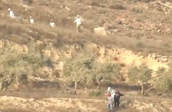
Thousands of Palestinians laid the body of 47-year-old Aisha al-Rabi to rest, in her hometown of Bidya, in the northern occupied West Bank district of Salfit, on Saturday afternoon.
The funeral procession set off from the hospital, where her she was pronounced dead, towards al-Rabi’s home before burial took place in the town’s cemetery.
Aisha was killed, and her husband, Yacoub, was injured, late Friday night, after Israeli settlers hurled rocks at their vehicle near the Zaatara checkpoint in southern Nablus in the northern West Bank.
The funeral procession set off from the hospital, where her she was pronounced dead, towards al-Rabi’s home before burial took place in the town’s cemetery.
Aisha was killed, and her husband, Yacoub, was injured, late Friday night, after Israeli settlers hurled rocks at their vehicle near the Zaatara checkpoint in southern Nablus in the northern West Bank.
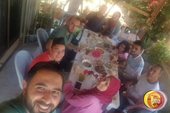
Aisha’s mother, Azziya, 70, told Ma’an News Agency that her daughter had been in Hebron, in the southern West Bank, for 3 days visiting her daughter, who is a dentist there.
Azziya said that the last thing Aisha said, during their last phone call, was a request to take care and to send her greetings to her father, before telling her that her husband, Yacoub, was coming to pick her up, so they could go home together.
Azziya burst in tears as she finished her sentence, “I did not know it would be our last call. I wish I wish I talked to her more, it was our goodbye conversation.”
Aisha, a mother of eight, had just finished her university education along with her daughters, as she had gotten married before she could finish her education.
Azziya said that Aisha’s visit to her dentist daughter in Hebron, for 3 days, was also to get her teeth fixed in preparation for her other daughter’s upcoming wedding.
One of Aisha’s brothers, Fawzat, was killed by Israeli forces one day before his wedding in 1999; Azziya added, “The occupation deprives me of my children for a second time.”
Aisha’s daughter Lamis also said that her mother was preparing for her sister’s upcoming wedding, “But the occupation took away our happiness.”
Eight-year-old Rama, Aisha’s youngest daughter, appeared as if she was waiting for some news, looking around her and asking her sisters every once in a while: “Is mom here, yet?”
Rama, who was with her parents, in the car, said, “Rocks came down at us like rain. I did not know what happened. My head was full of shattered glass. I looked at my mom and I saw her bleeding from her head. she did not say anything and I started crying.”
It is worth mentioning that, on September 12th, 1999, Aisha’s brother, Fawzat Mohammad Bolad, was killed by Israeli soldiers in Kharbatha village, west of Ramallah, just hours before his wedding, when he was heading to Ramallah to finalize preparations for his wedding.
Azziya said that the last thing Aisha said, during their last phone call, was a request to take care and to send her greetings to her father, before telling her that her husband, Yacoub, was coming to pick her up, so they could go home together.
Azziya burst in tears as she finished her sentence, “I did not know it would be our last call. I wish I wish I talked to her more, it was our goodbye conversation.”
Aisha, a mother of eight, had just finished her university education along with her daughters, as she had gotten married before she could finish her education.
Azziya said that Aisha’s visit to her dentist daughter in Hebron, for 3 days, was also to get her teeth fixed in preparation for her other daughter’s upcoming wedding.
One of Aisha’s brothers, Fawzat, was killed by Israeli forces one day before his wedding in 1999; Azziya added, “The occupation deprives me of my children for a second time.”
Aisha’s daughter Lamis also said that her mother was preparing for her sister’s upcoming wedding, “But the occupation took away our happiness.”
Eight-year-old Rama, Aisha’s youngest daughter, appeared as if she was waiting for some news, looking around her and asking her sisters every once in a while: “Is mom here, yet?”
Rama, who was with her parents, in the car, said, “Rocks came down at us like rain. I did not know what happened. My head was full of shattered glass. I looked at my mom and I saw her bleeding from her head. she did not say anything and I started crying.”
It is worth mentioning that, on September 12th, 1999, Aisha’s brother, Fawzat Mohammad Bolad, was killed by Israeli soldiers in Kharbatha village, west of Ramallah, just hours before his wedding, when he was heading to Ramallah to finalize preparations for his wedding.
13 oct 2018
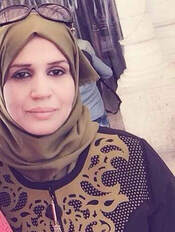
A general strike was declared Saturday across Salfit town of Bidya to protest Israeli settlers’ murder of the Palestinian woman Aisha Rabi.
Palestinian neighborhoods and communities in and around the town joined the strike, staged in response to the settlers’ crime.
The 45-year-old Aisha Rabi died before midnight on Friday, of a serious injury she sustained after Jewish settlers attacked the car she was aboard along with her husband near Za’atara checkpoint, south of Nablus city in the occupied West Bank.
In recent days, Jewish settlers intensified their assaults on Palestinian citizens and their property in the West Bank, especially in southern Nablus.
Palestinian neighborhoods and communities in and around the town joined the strike, staged in response to the settlers’ crime.
The 45-year-old Aisha Rabi died before midnight on Friday, of a serious injury she sustained after Jewish settlers attacked the car she was aboard along with her husband near Za’atara checkpoint, south of Nablus city in the occupied West Bank.
In recent days, Jewish settlers intensified their assaults on Palestinian citizens and their property in the West Bank, especially in southern Nablus.
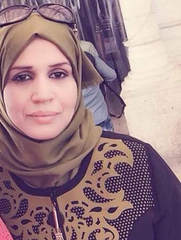
Aisha Mohammed Talal al-Rabi, 47
A group of Israeli paramilitary settlers attacked a Palestinian couple south of Nablus, in the northern part of the West Bank, on Friday, killing the woman and severely injuring her husband.
Aisha Mohammed Talal al-Rabi, 47, was riding in a car with her husband near the Za’tara roadblock, south of Nablus, in the northern part of the West Bank, when a group of Israeli settlers came onto the road and began throwing rocks at their car.
A group of Israeli paramilitary settlers attacked a Palestinian couple south of Nablus, in the northern part of the West Bank, on Friday, killing the woman and severely injuring her husband.
Aisha Mohammed Talal al-Rabi, 47, was riding in a car with her husband near the Za’tara roadblock, south of Nablus, in the northern part of the West Bank, when a group of Israeli settlers came onto the road and began throwing rocks at their car.
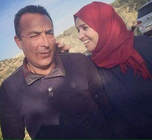
The slain woman was from Bidya town, northwest of Salfit.
The Israeli colonial settlers threw a number of large rocks, breaking the windshield of the car. They then continued to throw rocks, according to local sources, hitting the couple multiple times in the head and upper body.
Aisha died of blunt force trauma to the head, caused by a rock that was thrown at her head by the settlers.
Armed Israeli paramilitary settlers have launched a number of attacks on the Palestinian civilian population in the Nablus area, with the number of attacks drastically increasing since two Israeli settlers were killed by a Palestinian in the area on Monday.
Court issues gag order on death of Palestinian woman
Amid Palestinian claims the woman was killed by rock dropped on her vehicle by Jewish settlers, police launch investigation, but ask court for media blackout; 'Our daughter screamed and wept seeing her mother dying,' says husband of Aisha al-Rawbi.
The Jerusalem's Magistrate's Court issued a gag order on Saturday over the investigation into the death of Aisha al-Rawbi, 47, from the village of Biddya in the West Bank.
The Palestinians say al-Rawbi was killed after Jewish settlers hurled stones at a vehicle she, her husband and their nine-year-old daughter were riding in near the Tapuach junction on Friday.
The court, at the request of the police, barred the publication of any detail from the investigation.
Recalling the incident, husband Aykube al-Rawbi told Ynet he had just picked up his wife after attending a relatives' wedding in Hebron.
"On our way home, and as we were approaching the Tapuach checkpoint, a big rock was thrown at our vehicle, hitting my wife in the head," he said.
He decided to take his wife to the hospital. "I kept driving while my wife was covered with blood. Our daughter screamed and wept seeing her mother dying," he said.
"I was in a very bad shape. All the way to the hospital I was asking my wife to answer me, and at the same time tried to calm down our daughter, who wouldn't stop crying."
The incident sparked ire among Biddya's residents. A general strike, which included all public businesses and institutions, was declared in Biddya on Saturday following al-Rawbi's death.
The Israeli colonial settlers threw a number of large rocks, breaking the windshield of the car. They then continued to throw rocks, according to local sources, hitting the couple multiple times in the head and upper body.
Aisha died of blunt force trauma to the head, caused by a rock that was thrown at her head by the settlers.
Armed Israeli paramilitary settlers have launched a number of attacks on the Palestinian civilian population in the Nablus area, with the number of attacks drastically increasing since two Israeli settlers were killed by a Palestinian in the area on Monday.
Court issues gag order on death of Palestinian woman
Amid Palestinian claims the woman was killed by rock dropped on her vehicle by Jewish settlers, police launch investigation, but ask court for media blackout; 'Our daughter screamed and wept seeing her mother dying,' says husband of Aisha al-Rawbi.
The Jerusalem's Magistrate's Court issued a gag order on Saturday over the investigation into the death of Aisha al-Rawbi, 47, from the village of Biddya in the West Bank.
The Palestinians say al-Rawbi was killed after Jewish settlers hurled stones at a vehicle she, her husband and their nine-year-old daughter were riding in near the Tapuach junction on Friday.
The court, at the request of the police, barred the publication of any detail from the investigation.
Recalling the incident, husband Aykube al-Rawbi told Ynet he had just picked up his wife after attending a relatives' wedding in Hebron.
"On our way home, and as we were approaching the Tapuach checkpoint, a big rock was thrown at our vehicle, hitting my wife in the head," he said.
He decided to take his wife to the hospital. "I kept driving while my wife was covered with blood. Our daughter screamed and wept seeing her mother dying," he said.
"I was in a very bad shape. All the way to the hospital I was asking my wife to answer me, and at the same time tried to calm down our daughter, who wouldn't stop crying."
The incident sparked ire among Biddya's residents. A general strike, which included all public businesses and institutions, was declared in Biddya on Saturday following al-Rawbi's death.
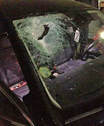
Thousands of Palestinians from the area are expected to attend her funeral.
"All of us are going to take part in the funeral of the heroine shahid (martyr),” said one Biddya resident. “The Israeli government must stop the murderers and not dismiss cases like this. Mosques and vehicles and houses were set on fire, and we didn’t see anyone arrested.”
He went on to say that “in my opinion, this disaster could’ve been avoided. This isn’t the first time stones are thrown at Palestinian vehicles. There were many cases that ended without death.”
Palestinian woman killed after settlers reportedly pelted her with stones
Police launch investigation into incident in which Aisha al-Rawbi, 47, from the village of Biddya, was reportedly killed by Jewish settlers who hurled stones at a vehicle she and her husband were riding in near Tapuach junction.
Aisha al-Rawbi, 47, from the village of Biddya in the West Bank, was killed Friday on Route 60 after settlers reportedly hurled stones at a vehicle she and her husband were riding in near the Tapuach junction, according to the Palestinians. Rab's husband was also wounded.
The police have launched an investigation into the incident.
A general strike, which will include all public businesses and institutions, was declared Saturday in Biddya following al-Rawbi's death.
"All of us are going to take part in the funeral of the heroine shahid (martyr),” said one Biddya resident. “The Israeli government must stop the murderers and not dismiss cases like this. Mosques and vehicles and houses were set on fire, and we didn’t see anyone arrested.”
He went on to say that “in my opinion, this disaster could’ve been avoided. This isn’t the first time stones are thrown at Palestinian vehicles. There were many cases that ended without death.”
Palestinian woman killed after settlers reportedly pelted her with stones
Police launch investigation into incident in which Aisha al-Rawbi, 47, from the village of Biddya, was reportedly killed by Jewish settlers who hurled stones at a vehicle she and her husband were riding in near Tapuach junction.
Aisha al-Rawbi, 47, from the village of Biddya in the West Bank, was killed Friday on Route 60 after settlers reportedly hurled stones at a vehicle she and her husband were riding in near the Tapuach junction, according to the Palestinians. Rab's husband was also wounded.
The police have launched an investigation into the incident.
A general strike, which will include all public businesses and institutions, was declared Saturday in Biddya following al-Rawbi's death.
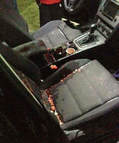
Al-Rabi's car
Prior to the incident, the Border Police, IDF and Shin Bet arrested the terrorist who carried out a stabbing attack outside the Samaria Territorial Brigade base in the West Bank on Thursday, in which an IDF reservist was moderately wounded and a civilian woman lightly hurt.
The perpetrator, a 19-year-old Palestinian from the village of Jamma'in south of Nablus, was taken in by the Shin Bet for further interrogation.
The terrorist stabbed the reservist, 32, who was standing at a bus stop. Soldiers and passersby then tried unsuccessfully to overcome the assailant.
Soldiers who were on the scene opened fire toward the fleeing terrorist, but he was able to escape. The soldiers' fire hit several nearby vehicles, and shrapnel from the shooting lightly wounded a woman from Elon Moreh.
Defense Minister Avigdor Lieberman praised the capture of the terrorist on his official Twitter account.
"An exceptional intelligence and operational work resulted in the capture of the terrorist. This allows us to redirect all the efforts into capturing the abominable murderer from the Barkan attack, with whom we will settle the score soon as well,” he wrote, referring to the manhunt for the perpetrator who shot dead Kim Levengrond Yehezkel and Ziv Hagbi at the Alon recycling factory last week.
The IDF said in a statement that the forces are still in pursuit of Ashraf Na'alwa, who carried out the attack in the Barkan industrial area.
The statement added that a number of suspects had been arrested in connection with the Barkan attack in the area of the Menashe Regional Brigade. In addition, during the search for illegal weapons conducted by the IDF and Border Police in the village of al-Benyamin, a gun had been found.
Prior to the incident, the Border Police, IDF and Shin Bet arrested the terrorist who carried out a stabbing attack outside the Samaria Territorial Brigade base in the West Bank on Thursday, in which an IDF reservist was moderately wounded and a civilian woman lightly hurt.
The perpetrator, a 19-year-old Palestinian from the village of Jamma'in south of Nablus, was taken in by the Shin Bet for further interrogation.
The terrorist stabbed the reservist, 32, who was standing at a bus stop. Soldiers and passersby then tried unsuccessfully to overcome the assailant.
Soldiers who were on the scene opened fire toward the fleeing terrorist, but he was able to escape. The soldiers' fire hit several nearby vehicles, and shrapnel from the shooting lightly wounded a woman from Elon Moreh.
Defense Minister Avigdor Lieberman praised the capture of the terrorist on his official Twitter account.
"An exceptional intelligence and operational work resulted in the capture of the terrorist. This allows us to redirect all the efforts into capturing the abominable murderer from the Barkan attack, with whom we will settle the score soon as well,” he wrote, referring to the manhunt for the perpetrator who shot dead Kim Levengrond Yehezkel and Ziv Hagbi at the Alon recycling factory last week.
The IDF said in a statement that the forces are still in pursuit of Ashraf Na'alwa, who carried out the attack in the Barkan industrial area.
The statement added that a number of suspects had been arrested in connection with the Barkan attack in the area of the Menashe Regional Brigade. In addition, during the search for illegal weapons conducted by the IDF and Border Police in the village of al-Benyamin, a gun had been found.
Page: 2 - 1
